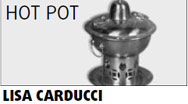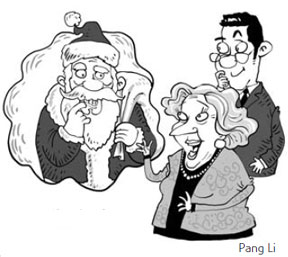When a former Chinese student asked me if I would go home during the "merry Christmas", I felt it was time to set things straight: "First of all," I answered, "I consider China as my home now, and Xmas lasts only 24 hours, so I don't have time to go back."

A common misunderstanding among many of my Chinese friends is to believe that Christmas is the beginning of the new year in the West and all non-Chinese persons celebrate the festive occasion in the same way.
Also known as Saint Nicholas, Father Christmas and Kris Kringle, this legendary figure doesn't represent "Western culture", but belongs to "some" Western cultures. And there are more Western cultures than there are Western countries.
Saint Nicholas was the bishop of Smyrna in what is now Turkey in the 4th century. He was generous and loving toward children and he often threw gifts through their windows. According to another legend, he used to hide coins in their shoes and for this reason he became the model of Santa Claus.
Saint Nicholas is revered among Catholic and Orthodox Christians and by Anglican and Lutheran churches. Through centuries, his bishop's robe was changed into a red coat and trousers with white collar and cuffs.
The American version of Santa Claus received its inspiration from the Dutch legend of Sinterklaas, brought by settlers to New York (then Nieuw Amsterdam) in the 17th century. This image became very popular in the United States. In 1931, Coca-Cola commercialized a plump and jolly Santa Claus image created by the artist Haddon Sundblom.
In the West, to some, the Santa Claus tradition is a diversion from the original religious meaning of Christmas and commercialization of Jesus' birthday. Santa Claus is opposed as an intrusion upon national traditions in several European countries. Saint Nicholas allegedly brings gifts to good children on Christmas Eve (Dec 24) or on his feast day, Dec 5 in the Netherlands and Dec 6 in Belgium.

When Santa Claus gives gifts to the whole family, on Christmas day, confusion is total. In Italy, for instance, an old woman called Befana distributes gifts to children on Jan 6. In Canada, when I was a student in a French and Catholic school, we were taught to wait until Jan 1 for opening our gifts, unlike the English Protestants who did it on Xmas day.
Russian Orthodox Church celebrates the Nativity on Jan 7. Moreover, it is now well known that Jesus was born in the summer, probably in July of the Gregorian calendar, but the Church fixed the date of Winter Solstice as Jesus' birthday in a way to "sanctify" a pagan festival.
Before wishing "Merry Christmas" to Westerners perhaps one should check whether they are religious or atheists, or whether they are Christians (Catholics, Protestants, and Orthodox), or Muslims, Buddhists, Jewish or Hindu.
Another cultural mistake, in my opinion, consists in decorating offices, hotels, stores, buses and all other places where "foreigners" (including from Japan, Korea, Pakistan, Nigeria, Iraq, Brazil, Cuba and others) go in China with Santa Claus images, as if all non-Chinese persons were Americans.
As Christmas becomes more popular in China, I wonder why the Chinese don't celebrate the Muslim Aid-el-Kebir as well?
